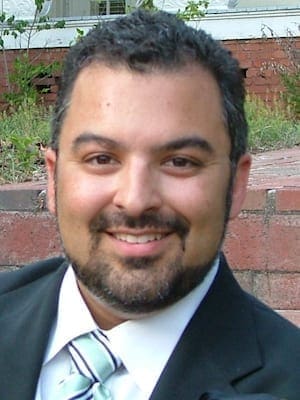Millions flocked last weekend to watch “Star Wars: The Force Awakens,” the seventh film in a franchise often dubbed the greatest science fiction movies of all time.
The franchise’s momentous history is not only due to its award-winning special effects, memorable characters and lofty music score, but also its ability to tap into the religious and spiritual undercurrents of our time.
The notion of spirituality is often portrayed as “the Force” throughout the “Star Wars” films.
This is the direct result of franchise creator George Lucas’ admission that he relied heavily upon mythologist Joseph Campbell’s book, “The Hero with A Thousand Faces.”
Here Campbell outlines a “hero journey” that he asserts many mythical saviors and heroes across religious or cultural settings traverse.
In the original three movies – “A New Hope” (1977), “The Empire Strikes Back” (1980) and “Return of the Jedi” (1983) – themes pertaining to call, conflict, death and rebirth, baptism and redemption borrowed heavily from Campbell’s theory.
Plotting the hero Luke Skywalker’s (Mark Hamill) course on the hero journey was simple enough.
The question remained, however, as to whether “The Force Awakens” would be able to hit the same universal spiritual nerves as effectively as the original films.
Directed by J.J. Abrams, “Force” takes place some 30 years after “Return of the Jedi.”
Remnants of the old Galactic Empire – defeated by Luke Skywalker and his father, Anakin Skywalker (David Prowse) – birthed the sinister First Order regime led by cryptic Supreme Leader Snoke (Andy Serkis) and Darth Vader-inspired henchman, Kylo Ren (Adam Driver).
A band of dissidents, the Resistance, is determined to defeat the First Order. Their priority is to destroy the Starkiller Base, a giant weapon reminiscent of the Death Star.
Although the plot seems recycled from “A New Hope,” the narrative arcs of characters new to audiences, such as courageous Rey (Daisy Ridley) and Stormtrooper-turned-resistance fighter Finn (John Boyega), refuse to fit into the formulaic hero journey with which fans are familiar.
The level of their disorientation is infuriating, and all they know is that a Resistance droid called BB-8 holds a map critical to the movement’s survival.
Later, (spoiler alert!) we find out that the map leads to Skywalker, who went missing when one of his Jedi pupils turned to the Dark Side. But even that is a dead end: the map is incomplete.
C-3P0 (reprised by Anthony Daniels), whose acute sense of the obvious remains consistent throughout the franchise, delivers what is perhaps the most important line in “Force” when he declares that the map does not match any known coordinates on record.
Luke’s destination remains unknown. Rey’s and Finn’s futures are uncertain. The Resistance is clueless as to how best to defeat the First Order.
Our heroes cannot plot a proper course on their map no more than we can plot their courses in Campbell’s hero journey. All seems lost for the time being.
But time is the linchpin to this tale because all of the characters, as uncertain as they are, find themselves in between the times as it were.
They sit squarely between Skywalker’s victory over the Empire long ago and a hoped-for future in which Luke’s return spells certain doom for the First Order.
It is an already-but-not-yet conundrum so familiar to Christians who worship Christ as Savior, but anticipate his Second Coming to defeat evil once and for all. It is a mysterious tension that implies lack of clarity in our own cultural context.
No wonder solutions for the most pressing issues of our day, such as immigration reform, gun violence or the environment, are piecemeal at best and illusive at worst.
Although “The Force Awakens” delivers a brilliant cast of characters that promises to set audiences on the edge of their proverbial seats, the internal uncertainty of the film is sure to haunt us because it reminds us all of the implicit challenges we face.
We fear, like the characters in the film, that we have lost our way.
Furthermore, while we Christians still wait expectantly for the return of our Savior to make things right, the new moral compasses with which we wrestle lead us into territories not found in existing records.
The global uncertainty reflected in the film offers Christians a distinct opportunity to reaffirm that the life and teachings of Jesus continue to provide the proper moral compass to help us find our way.
 Joe LaGuardia is senior pastor of Trinity Baptist Church in Conyers, Georgia. He is the author of “Awe and Trembling: Reflections for the Christian Journey,” a book of articles and homilies. His writings can also be found on his blog, Baptist Spirituality.
Joe LaGuardia is senior pastor of Trinity Baptist Church in Conyers, Georgia. He is the author of “Awe and Trembling: Reflections for the Christian Journey,” a book of articles and homilies. His writings can also be found on his blog, Baptist Spirituality.
Baptist Center for Ethics will observe its 25th anniversary in 2016. If you benefit from the daily articles appearing on EthicsDaily.com, as well as our documentary films, video interviews and other moral resources, please consider making a donation today. Click here to donate in $10 increments. Click here to donate in $25 increments. Click here to donate in $50 increments.
Joe LaGuardia is senior pastor of First Baptist Church in Vero Beach, Florida.

